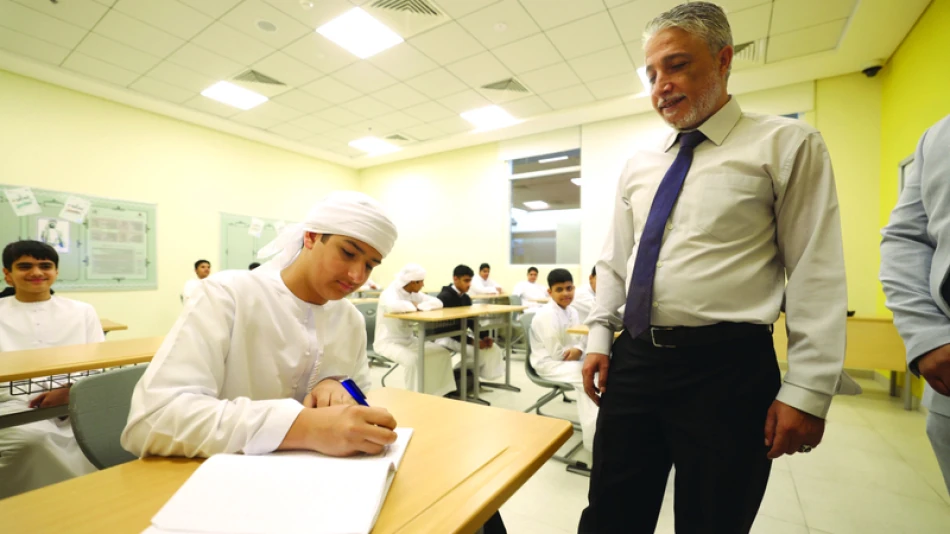
Ministry of Education Unveils Secondary School Evaluation and Promotion Policies
UAE Overhauls High School Assessment: New Grading System Balances Academic Rigor with Creative Skills
The UAE Ministry of Education has unveiled comprehensive changes to its high school evaluation framework for grades 9-12, introducing a dual-track assessment system that distinguishes between core academic subjects and applied creative disciplines. The reforms, effective for the 2025-2026 academic year, represent a strategic shift toward preparing students for both university admission and modern workforce demands while maintaining rigorous academic standards.
Two-Tier Assessment Framework Emerges
The new system divides subjects into two distinct groups with different evaluation criteria. Group A subjects—including Arabic, English, mathematics, sciences, Islamic education, and social studies—follow a traditional academic model where continuous school-based assessment accounts for 40% of the final grade, while centralized final examinations carry 60% weight.
Group B subjects encompass computing, design, arts, religious and health education, business management, and applied specializations. These receive 100% continuous assessment without centralized testing, reflecting their practical nature and the ministry's recognition that creative and technical skills require different evaluation approaches.
Strategic Term Weighting
For Group A subjects, the ministry has implemented an uneven distribution across three terms: 40% for the first term, 20% for the second, and 40% for the third. This structure frontloads academic pressure while maintaining emphasis on final performance, potentially reducing mid-year academic fatigue while ensuring students remain engaged through graduation.
Global Context: Following International Trends
The UAE's approach mirrors educational reforms in Singapore and Finland, where assessment systems increasingly differentiate between academic and vocational tracks. However, the Emirates' model is more integrated, keeping both pathways within the same institutional framework rather than creating separate schools.
This contrasts with the United States' Advanced Placement system, where students can choose rigorous academic tracks, and the UK's A-level system, which allows early specialization. The UAE appears to be maintaining breadth while acknowledging that different subjects require different assessment philosophies.
Implications for University Admission and Workforce Readiness
The dual reporting system—where Group A subjects display both letter grades and percentages while Group B subjects show only letter grades—signals clear priorities for university admissions. International universities typically focus on core academic performance, making the percentage reporting for Group A subjects crucial for students targeting overseas education.
For Grade 12 students, this transparency in academic performance measurement could enhance competitiveness for admission to selective programs, particularly in STEM fields where precise numerical scores often determine placement.
Second Chance Policy with Limitations
Students failing to achieve the 60% minimum in Group A subjects receive one retake opportunity, but successful completion only grants the minimum passing grade. This policy prevents grade inflation while offering academic redemption, though it may disadvantage students experiencing temporary difficulties during initial assessments.
Attendance Requirements Tighten Academic Standards
The 15-day absence limit for promotion represents a stricter approach than many international systems. This requirement, combined with the 60% minimum in all Group A subjects, creates a dual-hurdle system that emphasizes both academic performance and consistent engagement.
The policy particularly impacts students with health challenges or family circumstances, though the ministry has indicated accommodations for students with special needs will continue through individualized education plans.
Long-term Strategic Vision
These reforms align with the UAE's Vision 2071 and its goal of becoming a global knowledge economy hub. By maintaining rigorous academic standards while expanding practical skills assessment, the education system appears designed to produce graduates capable of contributing to both traditional industries and emerging sectors like artificial intelligence, renewable energy, and creative industries.
The emphasis on continuous assessment in creative subjects may also support the UAE's cultural and tourism ambitions, ensuring students develop practical skills in design, arts, and business management that directly support economic diversification goals.
The success of this balanced approach will likely influence educational policy across the Gulf region, where countries are similarly seeking to maintain academic excellence while developing more diverse skill sets in their graduate populations.
Most Viewed News

 Sara Khaled
Sara Khaled






